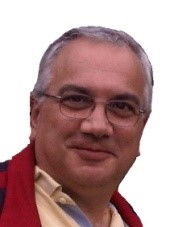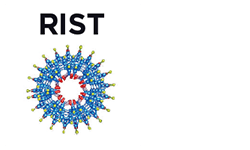An international 2+2 day seminar using visio conf
Consultants
Stéphanie Courant
 For the last 15 years, Stéphanie has worked in the field of support and education.
For the last 15 years, Stéphanie has worked in the field of support and education.
After training in coaching and Process-Com, she specialized in interpersonal relationships and team management. She provides training relating to communication, motivation and human management, in both English and French.
The highlights of her teaching process are:
- The inductive method: using experience to provide practical and conceptual complements.
- The capacity to facilitate training through simulation exercises.
- The coaching approach: tailored individual support within the group; each trainee goes away with a personalized development approach.
She coaches managers taking up positions, facing relational difficulties, in crisis or in transition.
Within RIST, she provides researchers and experts with team management coaching and training. She also provides research and expert career management support (CSMP – RIST method) and negotiation skills.
Ohanes Missirilian
 Ohanes is a Brazilian and French engineer with an MBA and a Master of science. He is an international trainer and consultant in purchasing, and a certified professional coach.
Ohanes is a Brazilian and French engineer with an MBA and a Master of science. He is an international trainer and consultant in purchasing, and a certified professional coach.
For the past 15 years Ohanes has acquired sound international expertise in training in purchasing.
He has managed international training programs for multinationals throughout the world, including DuPont, Arcelor, Unilever, L’Oréal, Nestlé, Valeo, BASF, Bayer, Nokia, Ericsson, SKF, Sanofi, Alcan, PSA, Autoliv and Alstom.
Ohanes is an expert in internal and external BtoB: Best Purchasing Practices.
He also holds academic positions at EM Lyon, ESCP-EAP, Ecole Centrale de Paris, Ecole des Ponts, Universidade de Aveiro, and HEC Geneva.
Ohanes joined RIST in 2012 and broadened his sphere of activity to include open innovation. He is responsible for developing RIST’s market in Switzerland. He has participated as a trainer in several key RIST training programs, including in Asia.
A programme designed for
R&D managers, Public research managers, Head of Research Units
Objectives
- Identifying clearly the parameters of the R&D Executive’s function and of its main responsibilities and levers.
- Putting into place the actions and attitudes that are essential for a R&D team to function well on a daily basis, with a focus on influence tools.
- Knowing how to position oneself at the right kind of level, with regards to colleagues, subordinates and immediate hierarchic superiors.
- Exchanging views on influence process, roles and difficulties.
- Reinforcing the sense of belonging to a team and to an evolving scientific project.
Our approach
Working on the three dimensions of R&D Team Management
- First dimension of the R&D Team Manager: understanding the notion of management by influence and developing one’s personal impact
- Second dimension of the R&D Team Manager: influencing positively the individual relations between agents
- Third dimension of the R&D Team Manager : leading the group
As we propose to develop not only an “intellectual” understanding but a real behavioural change, the draft we designed is a 2+2 day package.
Programme
First dimension of the R&D Team Manager: Understanding the notion of management by influence and developing one’s personal impact
- Introduction to management by influence: 4 main styles of management, tomorrow’s management and strength of leadership
- Taking into account the complexity of the research team (team members from other institutes, different areas of research, etc.)
- Highlighting the common traits between « scientific spirit » and « offensive strategies »
- Choosing offensive strategies in interpersonal relations process (agents, hierarchic superiors, colleagues, external contacts) by favouring a communication focussed on the influence.
- Giving the questioning (practical, rhetorical, analytical) and the listening processes all the importance they deserve, to encourage reflection, and to communicate suggestions in a positive manner.
Second dimension of R&D Team Manager: Managing positively the individual relation with agents
- Understanding the basis of the agent’s human drivers: competencies and motivation
- Defining, presenting and following an objective in a research environment: the co-elaboration of the objective.
- Putting into place a regular « follow up » of the performances, by integrating the annual interview in a dynamic manner
- Congratulating : Impacting the researcher’s motivation by giving a practical and honest assessment of notable achievements (technical and relational)
- Delegating and allocating responsibility : Transferring know-hows in terms of relations with others, to help the agent succeed with his/her mission
- Transmitting a difficult message by maintaining levels of motivation (end of a project, salary increase not matching the agent’s performance…)
- Refocusing an agent in a positive manner. Level 1 refocusing to encourage the questioning process. Level 2 refocusing in case there is no change.
- Conducting the annual interview: the three keys for success. Listening to maintain motivation; speaking truthfully; managing tense situations in a positive manner (positive disagreement).
Third dimension of the R&D Team Manager: Leading the group
- Inter-session Summary: analysis of experiments conducted between the two sessions
- Reminder of the concepts covered in session 1
- Understanding the three stages of development of a team within a research organization: birth, constitution, defining the vision.
- Developing a coherent and cohesive research team
- Re-motivating a team losing motivation: methods of collective reflection to redefine the expected aim (objectives, ways to get there)
- Building an engaging vision with the team: Strategy of objectives and transforming the vision into action plans.
- Differentiating the different types of meetings: information, conflict resolution, follow up/summary, decision-making.
- Leading a meeting in laboratory , by highlighting the 4 conditions for success: Opening (Road map), Raising interest (The rhetorical mode), Encouraging participation (The iceberg laws), Acting (The offensive plan of action)
- Informing with a four dimensional approach, so as to reduce the phenomenon of inference
- Resolving a problem within a team using creative techniques
- Favouring group decision-making with offensive strategies: Questions of procedures and taking into consideration defence mechanisms
An educational approach
- A topic is suggested to the participants, for example the delegating interview
- Teamed up in sub-groups, the participants think of a practical approach on how to delegate a mission, based on their combined knowledge
- Role play between Team Manager-Agent are led, with all the participants
- Each role play is then analysed, looking at the strengths and the areas to improve, so as to create a trusting environment
- A common thread on how to lead the delegation interview is then suggested by the consultant
- The participants works once more on the delegating interview, based on the new common thread.
Fees, information and registration
2 200 euros HT
Zoom
melany.mondo@rist-groupe.fr



